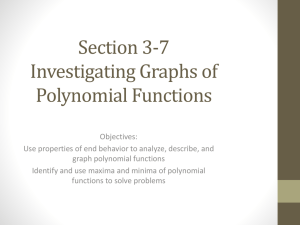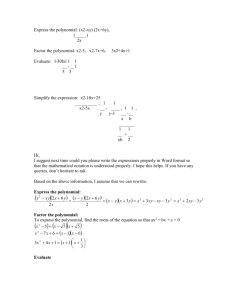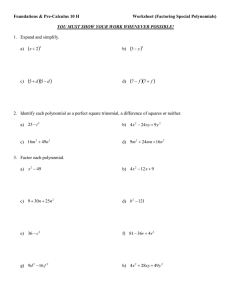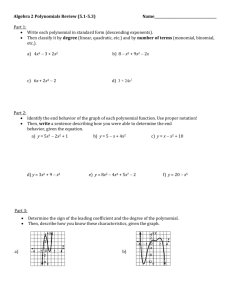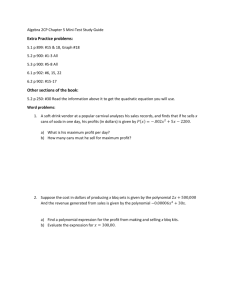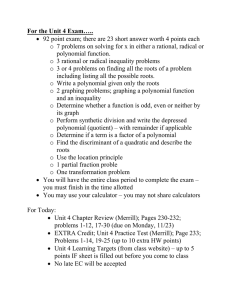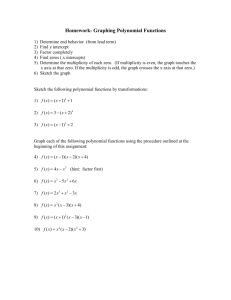Section 3-7 Investigating Graphs of Polynomial Functions
advertisement
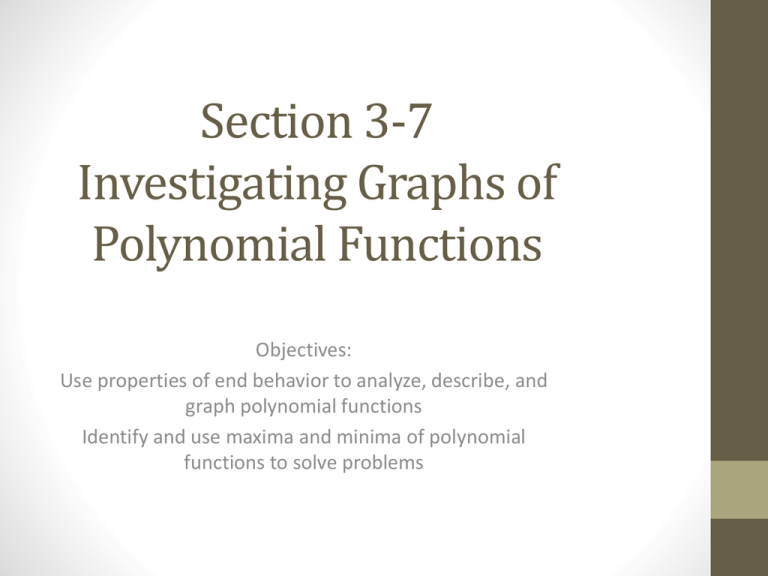
Section 3-7 Investigating Graphs of Polynomial Functions Objectives: Use properties of end behavior to analyze, describe, and graph polynomial functions Identify and use maxima and minima of polynomial functions to solve problems Investigating Graphs of Polynomial Functions • Polynomial functions are classified by their degree. • The graphs of polynomial functions are classified by the degree of the polynomial • Each graph, based on the degree, has a distinctive shape and characteristics Investigating Graphs of Polynomial Functions End Behavior • End behavior is a description of the values of the function as x approaches infinity (x+∞) or negative infinity (x-∞). • The degree and leading coefficient of a polynomial function determine its end behavior. • It is helpful when you are graphing a polynomial function to know about the end behavior of the function End Behavior Identify the leading coefficient, degree, and end behavior • Q(x) = –x4 + 6x3 – x + 9 • P(x) = 2x5 + 6x4 – x + 4 Identify whether the function graphed has an odd or even degree and a positive or negative leading coefficient Investigating Graphs of Polynomial Functions • Now that you have studied factoring, solving polynomial equations, and end behavior, you can graph a polynomial function Graph the Function • f(x) = x3 + 4x2 + x – 6 Graph the Function • f(x) = x3 – 2x2 – 5x + 6 Turning Points • A turning point is where a graph changes from increasing to decreasing or from decreasing to increasing • A turning point corresponds to a local maximum or local minimum • Local Maximum: y-coordinate of turning point if the graph is opening down i.e. the turning point is higher than all nearby points on the graph) • Local Minimum: y-coordinate of turning point if the graph is opening open (i.e. the turning point is lower than all nearby points on the graph) Investigating Graphs of Polynomial Functions • A polynomial function of degree n has at most n – 1 turning points and at most n x-intercepts • If the function has n distinct roots, then it has exactly n – 1 turning points and exactly n x-intercepts • You can use a graphing calculator to graph and estimate maximum and minimum values Steps on the Graphing Calculator • Step 1 – Graph the function • See if the graph has a local maximum or minimum • Step 2 - Find the maximum • Press 2nd TRACE (CALC) to access the CALC Menu. • Choose 4:maximum • Step 3 – Find the minimum • Press 2nd TRACE (CALC) to access the CALC Menu • Choose 3:minimum Determine Maxima and Minima with a Calculator • Graph f(x) = 2x3 – 18x + 1 on a calculator and estimate the local maxima and minima Determine Maxima and Minima with a Calculator • Graph g(x) = x3 – 2x – 3 on a calculator and estimate the local maxima and minima HOMEWORK • PAGE 201-203 #15-22, 24-42, 44, 48-50 • ACCELERATED ADD #51 & 52
